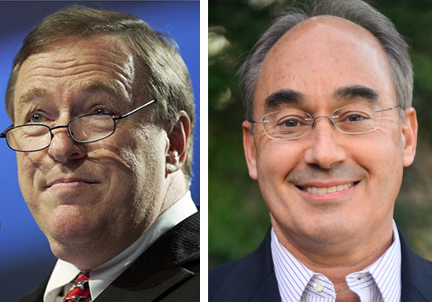The Republicans running for Maine’s 2nd Congressional District want to repeal and replace the federal Affordable Care Act, but a health policy expert said eliminating elements they disagree with could undermine parts of the law that they like.
The candidates, Kevin Raye and Bruce Poliquin, have run a heated primary, but they agree on getting rid of the national health care reform law championed by Democratic President Barack Obama that passed Congress without Republican support in 2009.
At a May debate in Brewer, Raye said the way the law passed “doomed it from the start.”
Poliquin said the parts of the law that “kill jobs” – such as an impending mandate that will require businesses with 50 or more people to provide health care to employees – must be removed, and also noted that many new taxes were created under the law.
But that doesn’t mean the candidates want every single element of the sweeping law scrapped. Neither does the general public, even though the law is unpopular overall, with Gallup polls for most of the past year finding majorities in opposition. However, parts of the law are popular.
If Raye or Poliquin wins the seat and Republicans keep control of the U.S. House of Representatives and win the Senate from Democrats, they likely won’t get a crack at repealing the law, also known as Obamacare, because the president will be in office through 2016.
The Democratic candidates, Troy Jackson and Emily Cain, support the Affordable Care Act and have said they would go further than that, supporting a single-payer health care system in which all U.S. citizens would have medical coverage paid for by a national program.
Erika Ziller, a health policy researcher at the University of Southern Maine’s Muskie School of Public Service in Portland who reviewed the Republicans’ past statements on the law, said there could be conflict between parts of the law they would keep and parts they would shed.
Those “are tensions that really haven’t been worked out because they’re still at the level of talking about principles rather than policy,” she said.
For example, in Brewer, Poliquin invoked his 23-year-old son, Sam, who is asthmatic, to say that a provision in the law should be retained that bans insurers from refusing to issue insurance to people with pre-existing health conditions.
“It is very important going forward that Sam is able to buy a health insurance policy that insures him for that pre-existing condition,” Poliquin said.
That’s a sentiment Raye –and 70 percent of those polled by the Kaiser Family Foundation in March – agreed with.
However, Raye spokesman Michael Leavitt said the candidate doesn’t support the unpopular “individual mandate” portion of the law, which forces most people to buy health insurance or pay a penalty. Not many do: Only 35 percent of people in the Kaiser poll supported it.
In a statement, Poliquin said he does not support “the federal government taking over the best private health care system in the world, including mandating an individual or family to purchase a health insurance plan” that might not meet their needs.
“As the Obamacare mandates kick in, we’re seeing once again how big government programs limit our choices and increase our costs,” Poliquin said in the statement.
But Ziller said the provisions work together: If pre-existing coverage was guaranteed without the mandate, many people would buy health insurance at the time they get a major illness, likely driving up costs.
“Basically, if you set up a dynamic where you can’t be denied coverage no matter how sick you are and whether or not you’ve ever been insured before, then if you don’t have the mandate to balance it out, it creates a real problem for insurers,” she said.
Poliquin also has railed against new taxes in the law, while Raye was paid by a medical manufacturing trade group in 2009 and 2010 to help it fight a new tax on medical devices established under the law.
But those taxes go into the pool of money that funds the health care law’s new provisions, including subsidies assisting low-income Americans in getting insurance coverage. Ziller said that could be another conflict in their stances on the issue.
Michael Shepherd can be contacted at 370-7652 or at:
mshepherd@centralmaine.com
Twitter: @mikeshepherdme
Send questions/comments to the editors.



Comments are no longer available on this story